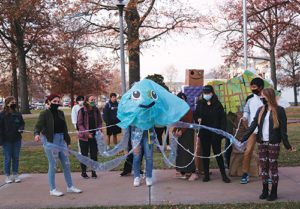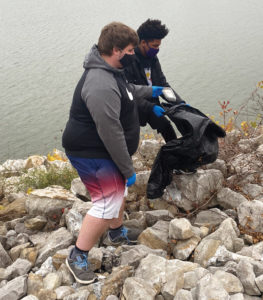 Truman’s new First-Year Experience establishes the framework for a lifetime of success.
Truman’s new First-Year Experience establishes the framework for a lifetime of success.
Truman is a school that prides itself on being distinct, and nowhere is that more apparent than its new First-Year Experience for incoming students. Every college has some form of orientation or new-student programming, but Truman’s is designed with a number of lofty goals in mind. Not only does it help new students adjust to college, it establishes a foundation to help them succeed academically, socially and professionally for the rest of their lives.
To achieve such ambitious goals, Truman’s First-Year Experience was implemented in fall 2020. In addition to the existing Truman Week component, the University added a self and society seminar class and a symposium series. Each element of the First-Year Experience has a specific goal, and in conjunction with one another, the infrastructure they create puts students on a path to reach their full potential.
The self and society seminar courses are a selection of unique classes meant to inspire and engage new students with the big questions, cultivate their intellectual and practical values and foster their character as they become grounded in methods of critical, multidisciplinary and intercultural thinking.
“Truman students like to engage in ideas. I would say that’s something I’ve encountered with all the students that I teach at Truman,” said Jocelyn Prendergast, associate professor of music. “They’re excited about their content area or their major for sure, but they’re also really interested in wrestling with the big ideas, like ‘how am I going to be in the world’ and ‘what does it mean to be a good citizen of this country’ or ‘what does it mean to be a good friend,’ for example. Those are the kind of big questions we engage in these seminar classes.”
For the self and society seminars, students can choose from a variety of subjects. Past seminars have addressed topics such as sustainability, fake news and the psychological effects of music, to name just a few.
The self and society seminars are three-credit courses that run the entirety of the semester. They are taken in conjunction with the one-credit Truman Symposium, the final component of the First-Year Experience. While the seminars focus on thought, the symposium is about action, and it provides a shared experience for all new students.
“The idea of our symposium is to introduce students to Truman, to Kirksville, and hopefully for the students to form a community where the students can interact with each other and support each other,” said Vayujeet Gokhale, associate professor of physics.
The symposium consists of three distinct parts: a discovery component, where students learn about themselves and their new environment; an action project, which enables them to make a positive impact in the community; and a shared experience to help them come together as classmates.
“Developing a sense of community is a goal of pretty much everything we do at Truman,” Prendergast said. “Community is a pretty critical part of living a well-lived life. It’s important for us to consciously develop community so that we can make sure that everyone is involved, all voices are heard, and that everyone feels like they have a place, because we want everyone to have a place.”
For the discovery portion of the symposium, students are asked to choose one experience from each category of social, cultural, natural and self. The goal is to help students realize what it means to be a responsible member of the Truman community.
 In the action part of the symposium, students choose from a list of projects to consider how and where they want to get involved, and they work with a small team of fellow students to achieve a common goal. Action projects have included a literacy outreach program for children in the community, combating light pollution and contributing to an accessible trail connecting Kirksville to Thousand Hills State Park. They are all noble endeavors that make an impact in town and on campus, but the value to students goes beyond the immediate returns of their projects.
In the action part of the symposium, students choose from a list of projects to consider how and where they want to get involved, and they work with a small team of fellow students to achieve a common goal. Action projects have included a literacy outreach program for children in the community, combating light pollution and contributing to an accessible trail connecting Kirksville to Thousand Hills State Park. They are all noble endeavors that make an impact in town and on campus, but the value to students goes beyond the immediate returns of their projects.
“The first thing I would like the students to appreciate is that this is your chance to make new friends. This is the first time you will be taking a class where a significant number of students will be with you working towards the same or very similar goals,” Gokhale said. “So, it’s a chance to learn from them, to share your experiences with them and form friendships and bonds that can last a lifetime.”
The shared experience component of the First-Year Experience involves all new students coming together for a series of events, approximately one per month. It reinforces many of the ideas students encounter during their self and society seminars and their action projects. It also provides an opportunity to hear from alumni and leaders in the community.
By the time students have completed their first semester, they should feel like a part of the community, have a fundamental understanding of how to learn and work with others, and realize how their actions contribute to things beyond themselves. That combination sets them up for success the rest of their academic careers and beyond.
Truman Symposium Action Projects
The action projects of the Truman Symposium promote engagement, community and collaboration. For fall 2020 and 2021, student team members worked on projects designed to make a positive impact in the community and beyond.
CREATE: Making Your Mark
This class explored how art can celebrate and strengthen a community. Students got firsthand experience using art as a tool to educate and connect with those around them through the use of cyanotype, an alternative photo process, to create collaborative artworks.
DESIGN: Sustainability Through Puppets
Using materials that otherwise would end up in landfills, students collaborated to create found object puppets. They used puppet theatre to raise community awareness about sustainability, waste and recycling, creating engaging characters and stories that advocate for social change.
ENABLE: FLATS Accessibility Project
Students assisted the Forest Lake Area Trail System nonprofit organization to establish an inclusive, accessible trail head inside the city limits. Action projects included fundraising, a community educational presentation, marketing and publicity, generating funding proposals and researching accessible recreation.
ENGAGE: Connecting the Community
Students learned communication planning and strategies for community engagement. They applied these skills to create awareness of campus projects and activities, as well as building a sense of community for all of the symposium projects and affiliated partners.
EXPLORE: Welcome to Fabulous Kirksville
Based upon interests, students developed a project with a team of peers that connected Truman and the community in order to cultivate an appreciation for the richness of life in Kirksville. Students were able to participate in civic engagement, have fun and learn about their new home.
FEED: Hunger in Adair County
To help alleviate the problem of food insecurity, students dedicated time to researching, volunteering, collecting and growing food for people in need. By participating in the course, students learn to lead, serve, organize, research and take satisfaction in giving to the community in a meaningful way.
FOCUS: Mindfulness in Student Life
Being mindful means understanding how stress, anxiety and even one’s own thoughts can influence their actions, impacting their lives and the lives of others. Action projects explored how mindfulness can deepen an understanding of the world.
ILLUMINATE: Combating Light Pollution
Students learned about the harmful effects of light pollution and ways to mitigate it. They participated in civic engagement and activism by working with law enforcement, parks and city administrators to install night-sky-friendly outdoor lighting with the aim of establishing a ‘dark sky community’ in Kirksville.
READ: Literacy Outreach Project
Students passionate about reading and working with kids participated in outreach projects to support literacy and a love of reading in Kirksville children, pre-K to 5th grade.
REDUCE: Finding a Sustainable Life
This course examined how people structure their lives and how they consume in an effort to take charge of Earth’s limited resources and establish a sustainable future.
WALK: Move-In Community
Students in this class explored the literal and metaphorical values of walking while they reflected on their place in the landscape. They also used walking to get to know the Kirksville community.
More information about Truman Symposium action projects can be found at symposium.truman.edu.

